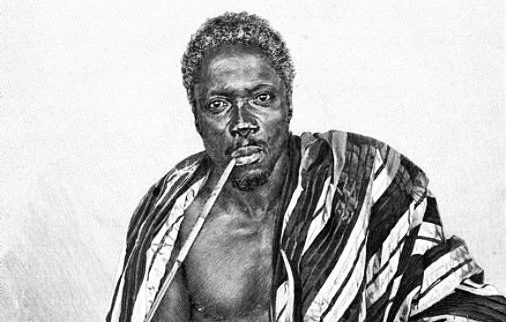Behanzin Hossu Bowelle was the last West African king of the 19th century and fought fiercely for the freedom of Dahomey (present day Benin) against French colonists. Born in 1844 under the birth name Kondo, Bowelle was the son of King Glegle, the 10th king of Dahomey, and was raised in the capital Abomey to succeed his father.
Bowelle was known for his tenacity and was called King Shark and Egg of the World, represented by his personal symbols: the shark, two crossed palm trees, and the egg. Some sources also cite his absolute mastery of the kingdom, such that “when the water was passed to him, the soldiers would throw themselves on the ground and say “A-h-h-h”, as though they were also drinking”.
Bowelle became king of Dahomey in 1890, following his father’s sudden passing, and ruled for five years (1889-1894) before he was exiled to Martinique.
Even before becoming king of Dahomey, Behanzin was involved with the politics of the region, particularly the foreign affairs between Dahomey and France. Around the time King Glegle was ruling, French colonialism played a huge role in many of the western African kingdoms. In 1868, King Glegle had formed a treaty with France to reduce their influence to only the territory of Cotonou, under the condition that the local people and their culture were not infringed upon. However, when France declared a protectorate over Porto Novo, another vassal state of Dahomey, in 1882, France imposed their own culture on the indigenous people and eroded King Glegle’s influence. King Glegle and Behanzin declared that French influence would not be tolerated, and following King Glegle’s death in 1890, Behanzin declared war on the French colonists.
Although Bowelle mostly utilised guerrilla warfare tactics in his war against the colonial invasion, Dahomey was a powerful kingdom, and had significant economic resources. Because of their established trade power, the Dahomey army was equipped with German rifles; Dahomey’s military was also the largest of the Western African kingdoms, consisting of 15,000 men and 5,000 women, called Amazons.
The Dahomey Amazons were a group of elite warriors, all trained markswomen. Bowelle commanded this massive force on two fronts: overtly in Cotonou as an overwhelming front, and covertly in Porto Novo, where he burned plantations that supplied most of the French colonists’ economic anchor in Dahomey. While this created a temporary peace, with a treaty signed under the conditions that France pay an annuity for the use of Cotonou, Bowelle continued to build up his army, fearful that France would retaliate when they had the opportunity.
Two years later, he declared the treaty null and renewed the war. Following four years of combat and an influx of French forces under the flag of Colonel A. A. Dodds Bowelle surrendered at the Battle of Adegon, where he lost 86 men and 417 Amazons. Seeking conciliation in France, he was tricked and sent to exile in Martinique, and died in Algeria in 1906, after refusing to sign a treaty with France.
France did eventually annex Dahomey into the French empire in 1900, and with it, the strongest of the Western African kingdoms.
King Behanzin Hossu Bowelle can be considered the last true king of Independent Dahomey, and it is clear he fought against the tide of colonialism with every fibre in his being. He loved and cared for his people deeply; giving himself up to save the Fon people from certain massacres. In the end, he never forfeited his kingdom’s independence, even to his last breath.
In one of the last speeches he gave to his people, he said: “Where are now the ardent amazons who were inflamed by a mighty anger?… Who will praise their splendid sacrifices?… Who will tell about their generosity?… How could I accept any sort of abdication without them? How could I dare present myself to you, brave warriors, if I signed the general’s paper?… For the survival of my people, [I agree] to meet in his country, according to his promise, the president of the French.”
Bowelle’s remains lie in his royal home in present-day Abomey, where a recently erected statue commemorates him as one of West Africa’s greatest kings.
Source: https://beyondthesinglestory




